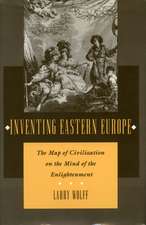Nazis and the Cinema
Autor Susan Tegelen Limba Engleză Paperback – 14 apr 2008
| Toate formatele și edițiile | Preț | Express |
|---|---|---|
| Paperback (1) | 162.39 lei 6-8 săpt. | |
| Bloomsbury Publishing – 14 apr 2008 | 162.39 lei 6-8 săpt. | |
| Hardback (1) | 301.53 lei 6-8 săpt. | |
| Bloomsbury Publishing – 31 mai 2007 | 301.53 lei 6-8 săpt. |
Preț: 162.39 lei
Preț vechi: 247.09 lei
-34% Nou
Puncte Express: 244
Preț estimativ în valută:
31.08€ • 32.33$ • 25.66£
31.08€ • 32.33$ • 25.66£
Carte tipărită la comandă
Livrare economică 15-29 aprilie
Preluare comenzi: 021 569.72.76
Specificații
ISBN-13: 9781847252111
ISBN-10: 1847252117
Pagini: 336
Ilustrații: 18
Dimensiuni: 156 x 234 x 26 mm
Greutate: 0.57 kg
Editura: Bloomsbury Publishing
Colecția Hambledon Continuum
Locul publicării:London, United Kingdom
ISBN-10: 1847252117
Pagini: 336
Ilustrații: 18
Dimensiuni: 156 x 234 x 26 mm
Greutate: 0.57 kg
Editura: Bloomsbury Publishing
Colecția Hambledon Continuum
Locul publicării:London, United Kingdom
Caracteristici
A fascinating look at the cinema produced and used by Nazi Germany
Notă biografică
Susan Tegel was formerly head of History at the University of Hertfordshire, UK. She is the author of Jew Suss (2011).
Cuprins
IllustrationsPrefaceAcknowledgements1. Hitler: Image-Building2. Nazi Propaganda3. The German Film Industry to 19184. Weimar Cinema5. The German Film Industry 1933-19456. The Kampfzeit Films, 1933 7. Leni Riefenstahl's Triumph of the Will8. A Judenfrei Cinema: 1934-19389. Two German Comedies (1939)10. The Rothschilds and Jud Süss 11. Der Ewige Jude (1940)12. The Second World War13. Film and the 'Final Solution'14. Theresienstadt15. LiberationNotesFilmographyBibliographyIndex
Recenzii
Tegel's work offers a comprehensive, accessible introduction to the cinema of the Third Reich through the lens of antisemitism.
Susan Tegel, the historian who advised the legal team that was preparing to sue Leni Riefenstahl for Holocaust denial, is the latest scholar to analyze fully the role played by movies in the Third Reich. It's a testament to the field's richness that her Nazis and the Cinema covers territory left largely unexplored in the two major books on the subject, Linda Schulte-Sasse's Entertaining the Third Reich, and Eric Rentschler's Ministry of Illusion (both published in 1996) ... [Tegel] emphasize[s], in a way that they do not, the manner in which Jews were represented on the German screen.
Susan Tegel's book is a brilliant pulling-together of a lot of research and thinking about film in the Nazi era.
It is an important volume for historians, sociologists, and film scholars alike.
Susan Tegel deserves applause for achieving exactly what she sets out to accomplish: exploring the intersection of art and politics as well as the efficacy of Joseph Goebbels' propaganda machine ... Tegel's jargon-free prose makes this book a palatable choice for an upper-division course ... Posing questions rather than asserting overambitious claims, Nazis and the Cinema provides its readers with substantial cerebral nourishment.
Tegel's judicious overview is the only English-language account to build on recent German micro-histories.
Susan Tegel's Nazis and the Cinema is built on an immensely rich bibliography, uniting research from across Europe, as well as Israel and North America. Tegel wears her impressive learning lightly, but there is no mistaking her extensive familiarity with her sources.
Informed by a substantial amount of primary source research [this book] offers new perspectives on the subject. It is also lucidly written and persuasively argued . Tegel's approach is very much that of the historian with the emphasis throughout on understanding films in context . Overall, this is a highly illuminating and well-researched book that will almost certainly become the standard text for a generation.
Susan Tegel, the historian who advised the legal team that was preparing to sue Leni Riefenstahl for Holocaust denial, is the latest scholar to analyze fully the role played by movies in the Third Reich. It's a testament to the field's richness that her Nazis and the Cinema covers territory left largely unexplored in the two major books on the subject, Linda Schulte-Sasse's Entertaining the Third Reich, and Eric Rentschler's Ministry of Illusion (both published in 1996) ... [Tegel] emphasize[s], in a way that they do not, the manner in which Jews were represented on the German screen.
Susan Tegel's book is a brilliant pulling-together of a lot of research and thinking about film in the Nazi era.
It is an important volume for historians, sociologists, and film scholars alike.
Susan Tegel deserves applause for achieving exactly what she sets out to accomplish: exploring the intersection of art and politics as well as the efficacy of Joseph Goebbels' propaganda machine ... Tegel's jargon-free prose makes this book a palatable choice for an upper-division course ... Posing questions rather than asserting overambitious claims, Nazis and the Cinema provides its readers with substantial cerebral nourishment.
Tegel's judicious overview is the only English-language account to build on recent German micro-histories.
Susan Tegel's Nazis and the Cinema is built on an immensely rich bibliography, uniting research from across Europe, as well as Israel and North America. Tegel wears her impressive learning lightly, but there is no mistaking her extensive familiarity with her sources.
Informed by a substantial amount of primary source research [this book] offers new perspectives on the subject. It is also lucidly written and persuasively argued . Tegel's approach is very much that of the historian with the emphasis throughout on understanding films in context . Overall, this is a highly illuminating and well-researched book that will almost certainly become the standard text for a generation.












